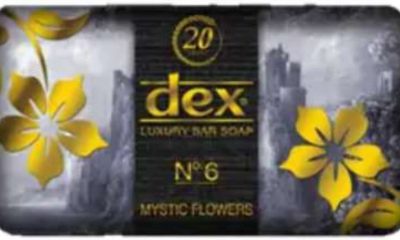Business
NAFDAC, govt policies push prices of basic drugs beyond reach

By ADEBAYO OBAJEMU
The trouble of average Nigerian is by no means reducing. Buffeted on all sides by debilitating economic hardship, and worsening living conditions, and the icing on the cake is the skyrocketing prices of essential drugs, common illnesses.
It is natural to fall sick and get treated; but it is becoming increasingly more difficult to get treated given the abnormal level of prices of drugs compared to what obtained just a year ago.
Consequently, fewer and fewer people are able to afford the crippling prices drugs shutting out many from accessing needed supply as they can no longer foot the bills. The obvious effect is that more Nigerians are more likely die of preventable diseases, such as stroke, high blood pressure, diabetes, typhoid etc.
A market survey undertaken by Business Hallmark has revealed glaringly startling statistics of astronomical rise in the prices of prescription drugs and essential drugs, including other pharmaceutical products.
The onset of this progressive rise was December 2019, and this has largely led to a situation where buying essential and prescription medications have become unaffordable, and therefore inaccessible, by quite a large number of Nigerians, who live on the edge of poverty; but need medical treatment.
Many experts spoken to by this medium say quite a number of factors have been responsible for the rising cost of pharmaceutical products. They blamed government policies, inflation and forex exchange for the rising cost.
Deji Atteh- Igbimoh, a registered nurse told Business Hallmark that in 2019 the National Agency for Food and Drug Administration and Control (NAFDAC) increased the cost of registering new prescription drugs from N350,000 to N1.05 million – which is a huge increase amounting to 350 percent. In the same vein, the over-the-counter drugs jumped from N1 million to N4 million.
James Oluwaseun, a registered pharmacist, and chief executive officer of Orpheus Pharmacy Abule Egba noted that forex and inflation among other factors are also responsible for the high costs of drugs.
He also said other reasons for the rise in prices of essential and prescription drugs and other medical/pharmaceutical products include coronavirus pandemic; bureaucracy and disruptions in worldwide supply value chain; which are still affecting, as well as increased freight costs associated with importation of Active Pharmaceutical Ingredients (APIs), excipients and finished products.
He stated that N100 billion stimulus package was slow in coming and disbursement lacking because of stiff conditions, adding that the fund was meant to expand production and capacity of pharmaceutical companies, but largely ended up in the hands of importers.
Many experts who spoke to this medium say difficulties in accessing foreign exchange, and its rate coupled with inflation should largely blamed for the astronomical rise beginning from the importation of Active Pharmaceutical Ingredients (APIs), to the point of manufacturing and finished products as well as at the consumer level.
Findings by this medium revealed that the country relies for its drugs needs mainly on importation by at least 70 percent. Some of these costs have risen by between 30 per cent and 500 per cent in the last one year.
Mostly affected are prescriptions drugs, including infusions, orphan drugs, and particularly drugs used by cancer patients, pregnant women as well as other drugs for chronic illnesses, have risen to such levels that many patients can no longer afford them.
According to the Consumer Price Index (CPI) for July 2022 by the National Bureau of Statistics (NBS), inflation rate in the country has risen to a 17-year high at 19.64%. This compares to 18.6% recorded in the previous month of June.
Recall that the last time the country had that kind of experience which was above 19.64% was in September 2005 when it rose to 24.32%.
Business Hallmark’s findings have shown that NBS’s data on CPI made a specific mention about the rise in food inflation in the CPI, among others, but there was no mention of the effect of the inflation increase on drugs.
In the current survey undertaken by this medium, the prices of antibiotics, antihistamines, anti-hypertensives, anti-diabetics pregnacare, and others, depending on the brand name, have really gone rooftop as they hover between 30 per cent and 85 per cent while the prices of syringes have risen by between 50 per cent and 100 per cent.
According to the findings, infusions per unit, which was around N120 in 2021 now goes for N700, which is about 500 per cent increase. Even analgesics have also gone up. A sachet of paracetamol which went for N50 as at December 2021 is now N100 . Prices of anti-malarial have also gone up.
A number of patients spoken to by this medium who are under treatments for various health conditions are lamented of being unable to follow their drug regiment as their brands of drugs are no longer available or the cost of alternatives has hit the roof.
Many diabetics and hypertensives, as well as cancer patients who are on routine drugs, are on drug holidays as a result of high cost. Some routine drugs used in pregnancy are not immune from this rise in prices.
Pharmacist John Umeh of Grace Pharmacy, Ajayi Road, Ogba told Business Hallmark that it has become a herculean task to make arrangements for the importation for anti-cancer and other chronic conditions’ medications that require special treatments , as a result of soaring foreign exchange and the inability to secure it through the Central Bank of Nigeria (CBN) official rate.
According to Umeh, some of these prescriptions drugs are often not warehoused in the pharmacy due to their storage condition and the fact that they are more expensive and needed by fewer patients.
Apart from the hurdles or challenge associated with finished products, manufacturers of drugs in Nigeria are going through dire straits as 80 per cent of APIs used in manufacturing drugs locally are imported.
According to Umeh and others spoken to , unless government intervenes, many drug companies may go down due to the inability to access foreign exchange and the cost of diesel among others.
Some end users- mainly patients admitted that their conditions are becoming dangerous due to their inability to afford routine drugs.
Sule Abudu, a diabetic said he had been on diabetes drugs for over three years, and expressed dismay and frustration that he could no longer afford the treatment due to rising price.
“Up to last year September, I could purchase my routine drugs at N3, 000, but now I need nothing less than N7, 500 to do two weeks of treatments.
Umeh expressed frustration over the inability of many patients to buy necessary drugs. Last week I felt sad when I met one of my patients who had not been coming for sometimes, even though he is on prescriptions drugs. When I confronted him, he said he had decided to be patronizing ‘Agbo’ (herbal treatment for chronic diabetes)”.
“Most of our customers now just routinely breeze in and out without buying anything because of what they call high cost of drugs”.
Aderinto Abiodun who is a patent seller said, “some of these drugs have gone up beyond our wildest imagination. For instance, Acini we used to buy at N300 last year is now around N400, Ampiclox sold for N700 last December now hovers today between N800 and N950, while antimalarials like Amatem sold for less than N1, 000 last year now goes for N1, 500 ”.
“Some of the drugs are even off the shelf because you can’t buy what you know you cannot sell. It is not good for business”, Umeh said.
“The high dollar rate is affecting us because prices of drugs aren’t stable, you can buy at N1, 000 today and by tomorrow it has jumped to N1, 500. It is tiring and discouraging.”
Malaria which is widely seen as common ailment is now about to have a field day due to the fact that antimalarials are becoming expensive.
The prices of most malaria drugs have gone up Amatem Forte that used to sell for N1, 300 last year is now N2, 000, while Colart that was sold for N700 in December is now N1, 800.
Lonart, which used to go for N1, 900 is now N2, 500. P-Alaxin which used to sell for N1, 000 is now N1, 500 per sachet.
Apart from the rising prices of drugs, pharmacist Okechukwu Nnamdi of Rose Pharmacy, Ota told this medium that the operational cost of the pharmacy means he has to increase prices of his drugs.
“The increase in the price of diesel would have forced us to close down if not for the inverter that we are using.”
He said he had about six customers , mainly diabetics who are on insulin but they have refused to come for their drugs because of high prices of those drugs.
“It is not as if they are buying from another place but they complained of the high cost of insulin”, he said.
The cost of a vial insulin injection that used to cost between N2, 500 and N4, 000 last year is now sold for N5, 000 to N7, 000. The price of test strips is now about N7, 000 as against N4, 000 for a pack of 50 strips in the preceding December.
Also affected are pregnancy care drugs. The foreign exchange rate and the increased price of diesel have pushed up the costs of these drugs.
Pregnacare Plus that used to sell for N6, 000 last year is now N19, 000, while Pregnacare Max that sold for N7, 000 is now N18, 050”.
Rocephin injection per pack, an antibiotic for saving lives, was N3, 500 as at last December it now goes over N5,000 currently. Zinnat 500mg tab, another antibiotic, formerly sold for N3, 000 last year now sells at N5, 000 plus and according to findings the syrup is not readily available anymore.
Zinnat syrup for example is no longer available so are other products like Epilim syrup which is an anti-epileptic medicine used in children , same goes for some other essential medicines.
Dr. Sunday Adeyemi of the department of community medicine, Kogi State University Faculty of Medicine said in a chat with this medium that the rising costs of drugs could come with severe consequences of morbidity and mortality to consumers of healthcare products in Nigeria.
“This price increase will affect patients, drug manufacturers, and the economy at large. The reason is that when prices of pharmaceutical drugs go up beyond what patients can buy, the people who need them cannot buy them.
“And when drugs cannot be purchased due to their exorbitant prices, the pharmaceutical industry will not contribute adequately to national Gross Domestic Product (GDP).”
Many agree that the sharp rise in prices can encourage fake and counterfeit drugs.
PRICE LIST
2021 2022
INFUSION PER UNIT N120/ N 170
(DIABETES DRUG) TISLOT N3000 / N 7000
PARACETAMOL N50 / N100
ACINI N300 / N400
AMPLICLOX N700 / N800
AMATEM (ANTI MALARIA) N900 / N1500
AMATEM FORTE N1300 / N2000
COLART N700 / N1800
LONART N1900 / N2500
P-ALAXIN N1000 / N1500
VIA-INSULIN INJECTION N2500 – 4000 N5000 – 7000
PREGNANCY CARE PLUS N6000 / N19000
PREGNANCY CARE MAX N700 / N1850
ROCEPHIN INJECTION (PER PACK) N3500 / N5000
ZINNAT (500 MG TAB) N3000 / N5000
DISPOSABLE GLOVES(X 100) N500 / N1500
AMOXICILLIN CLAVULANIC ACID (625 MG) N85 (PER TABLET) N150
COUGH EXPECTORANT N250 (PER BOTTLE) N400
SURGICAL FACE MASK N50 / N500






